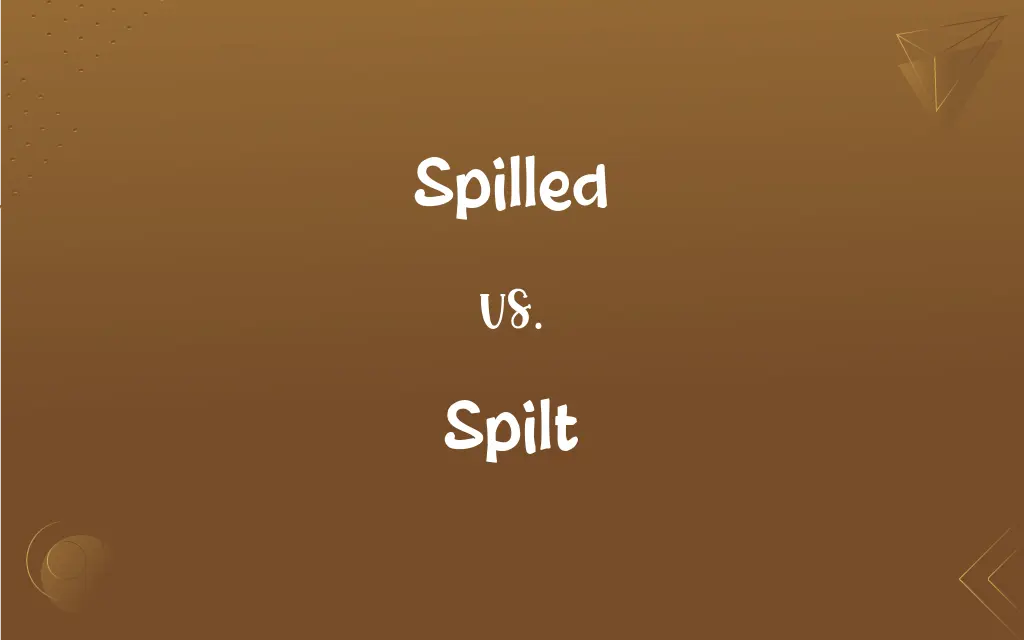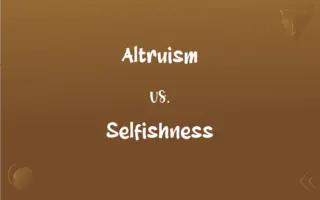Spilled vs. Spilt: What's the Difference?
Edited by Harlon Moss || By Janet White || Published on November 4, 2023
"Spilled" and "spilt" both mean to cause or allow liquid to flow over; "spilled" is more common in American English, while "spilt" is more common in British English.

Key Differences
"Spilled" and "spilt" are both past tenses of the verb "spill," which means to cause or allow (liquid) to flow over the edge of its container, especially unintentionally. "Spilled" is the standard past tense form in American English, reflecting a preference for "ed" endings in irregular verbs. In contrast, "spilt" is the standard past tense form in British English, which often retains older forms of words that have been updated in American English.
When someone says they "spilled" the milk, they are typically using American English, and it simply means they have accidentally caused the milk to flow out of its container. On the other hand, if someone says they "spilt" the milk, they are likely using British English to convey the same message. Both words communicate the same occurrence but are regional preferences in verb form.
In literature, "spilled" might be used in American publications, and the spelling conforms to American English conventions. You'll see it used in sentences like, "He spilled the beans," which means he revealed a secret. "Spilt," however, would appear in British publications, denoting the same action but aligning with British spelling conventions. An example sentence is, "She spilt tea on her dress."
In everyday conversation, an American English speaker might say, "I spilled water on my laptop," indicating a recent accident involving water and a laptop. A British English speaker, using the same context but different regional English, might say, "I spilt water on my laptop." Both sentences indicate the same unfortunate event and are correct within their respective versions of English.
The words "spilled" and "spilt" not only indicate the physical act of a liquid going where it shouldn't but can also be used metaphorically. In American English, one might say, "They spilled their emotions," suggesting a release of pent-up feelings. In British English, the same sentiment might be expressed as, "They spilt their emotions." Despite the regional differences in spelling, the meaning remains consistent.
ADVERTISEMENT
Comparison Chart
Common Usage
American English
British English
Spelling
Ends with "-ed"
Ends with "-t"
Pronunciation
Pronounced with a "d" sound
Pronounced with a "t" sound
Context of Use
Used in both formal and informal American English
Used in both formal and informal British English
Consistency
Consistent with American preference for regular past tense forms
Consistent with British use of historical forms
ADVERTISEMENT
Spilled and Spilt Definitions
Spilled
To flow over the edge of a container by accident.
The water spilled over the rim of the glass.
Spilt
To allow liquid to flow out unintentionally.
She spilt wine on the carpet.
Spilled
To let liquid fall out of its container accidentally.
I spilled soup on the stove while cooking.
Spilt
Used to indicate the accidental release or revelation of something.
Secrets were spilt during the heated discussion.
Spilled
Past tense of "spill," meaning to accidentally pour out liquid.
She spilled coffee on the contract.
Spilt
Past tense and past participle of "spill" in British English.
He spilt a whole pint of milk.
Spilled
To cause (liquid) to flow out from somewhere.
They spilled oil into the ocean after the shipwreck.
Spilt
To cause liquid to overflow from its container.
The milk was spilt all over the floor.
Spilled
To cause or allow (a substance) to run or fall out of a container.
Spilt
To reveal information unintentionally.
I spilt the news about their surprise party.
Spilled
To scatter (objects) from containment
Spilled the armload of books on the desk.
Spilt
A past tense and a past participle of spill1.
Spilled
To shed (blood).
Spilt
That has been spilled.
Don't cry over spilt milk; tears won't put it back in the glass.
Spilled
To relieve the pressure of wind on (a sail).
Spilt
Simple past tense and past participle of spill
Spilled
To cause or allow (wind) to be lost from a sail.
Spilled
To cause to fall
The rider was spilled by his horse.
Spilled
(Informal) To disclose (something previously unknown); divulge
The witness spilled all the details about the suspect.
Spilled
To run or fall out of a container or containment.
Spilled
To come to the ground suddenly and involuntarily.
Spilled
To pour out or spread beyond limits
Fans spilled onto the playing field.
Spilled
The act of spilling.
Spilled
An amount spilled.
Spilled
A fall, as from a horse.
Spilled
A spillway.
Spilled
Simple past tense and past participle of spill
Spilled
To disseminate information or secrets carelessly or by mistake.
He spilled all the details about their plans.
FAQs
Can "spilt" be used in American English?
It's understood but less common than "spilled."
Are "spilled" and "spilt" interchangeable?
Yes, but "spilled" is American English, and "spilt" is British English.
In literature, would a British author use "spilled" or "spilt"?
Typically, "spilt" would be used, following British conventions.
Do "spilled" and "spilt" carry the same meanings?
Yes, both indicate the accidental flow of liquid or revealing information.
Are there any grammatical differences between "spilled" and "spilt"?
No, the difference is primarily regional spelling.
Can "spilled" be used for situations other than liquids?
Yes, it can also refer to revealing secrets or emotions.
Are there regions in the U.S. where "spilt" is more common?
It's generally less common but may appear in literature or historical contexts.
Can "spilt" be used in a formal context?
Yes, in British English both formal and informal contexts use "spilt."
Is there a difference in pronunciation between "spilled" and "spilt"?
Yes, the end sounds are “-d” for "spilled" and “-t” for "spilt."
Would an American dictionary include "spilt"?
Yes, but it would be identified as the British English form.
Does the use of "spilled" over "spilt" in American English have historical reasons?
Partially, American English tends to regularize irregular past tense forms.
Is there any difference in formality between "spilled" and "spilt"?
No, the difference is strictly regional, not about formality.
Is "spilt" commonly used in modern British English?
Yes, it's the standard past tense of "spill" in British English.
How did "spilled" and "spilt" develop differently in American and British English?
It's due to varied spelling conventions and linguistic evolution.
Do British English speakers understand if "spilled" is used instead of "spilt"?
Yes, it's understood as both words are taught and used in media.
Is "spilt" used in Australian and Canadian English?
"Spilt" is common in Australian English, less so in Canadian English.
Is "spilt" considered old-fashioned in American English?
It's less about being old-fashioned and more about regional preference.
Are there idioms where "spilled" and "spilt" are used interchangeably?
Yes, like “don’t cry over spilled/spilt milk.”
In academic writing, should I use "spilled" or "spilt"?
Use "spilled" in American English contexts and "spilt" in British English.
Can "spilt" be seen as a spelling mistake in American English?
Not usually, but "spilled" is the preferred form.
About Author
Written by
Janet WhiteJanet White has been an esteemed writer and blogger for Difference Wiki. Holding a Master's degree in Science and Medical Journalism from the prestigious Boston University, she has consistently demonstrated her expertise and passion for her field. When she's not immersed in her work, Janet relishes her time exercising, delving into a good book, and cherishing moments with friends and family.
Edited by
Harlon MossHarlon is a seasoned quality moderator and accomplished content writer for Difference Wiki. An alumnus of the prestigious University of California, he earned his degree in Computer Science. Leveraging his academic background, Harlon brings a meticulous and informed perspective to his work, ensuring content accuracy and excellence.






































































